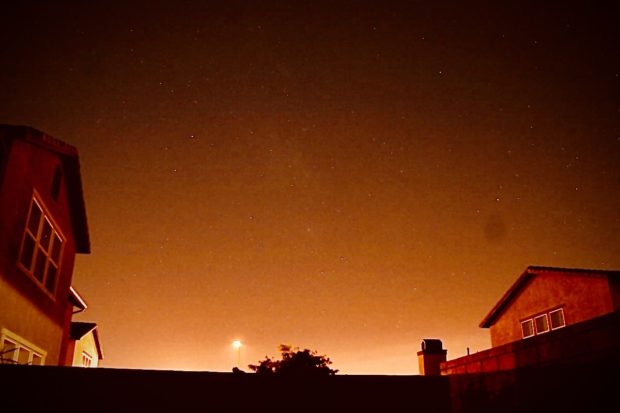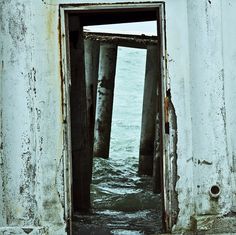You have no items in your cart. Want to get some nice things?
Go shopping
The snows that had melted in the day made the roads of Drumlin a flowing thing, but now that the evening had come the waters were beginning to freeze. The paths shone like mirrors of lambent ice, and there was a mongrel dog, a kind of mangy but handsome dog, that was gliding along such a path with a dirty red bandanna tied around its neck. In its effort to stay balanced, the dog appeared to be dancing, at least that’s how it seemed to two boys who watched it glide along with a sorrowful expression on its face.
“That’s class,” said Dave, spitting through a gap in his teeth.
“It was okay,” said Jamie.
“We follow it?”
“The dog?”
Dave shrugged. Jamie looked up at Ciara Lawler’s house, at the yellow light in the top-right bedroom, Ciara Lawler’s bedroom, the blinds drawn, and a Ciara Lawler-shaped silhouette.
“Ciara Lawler,” he whispered, fiercely, as if the words might summon her. “Ciara.”
“It’s freezing here. Will we move at least?”
Jamie turned away from the window with reluctance and looked at the dog receding into the distance, still gliding.
“Okay,” he said.
They followed the dog into Riordan’s field, and there was a burnt-out car in the field’s centre that the dog pissed on so that, for a few wonderful seconds as the street lights caught the swirls of steam, the car looked on fire, then only misty, then nothing. The dog trotted off indifferent to its magic, and the sparkling grass parted under its paws. The boys followed. Why, they didn’t know. It was something for the evening. They’d been to the shops twice and had no money left. The dog led them towards the church. For a moment it seemed it might actually go in, but then it stopped, sniffed the air and set off at a run towards the car park. At the end of the car park there stood a concrete shed. The shed was built a few feet from a wall so that at its back there was a kind of narrow lane. The dog went into this narrow lane, and the boys followed. This is what they saw: graffiti on the walls, mostly names in bright jagged lettering, empty soup tins, cigarette butts, cider cans, a glowing torch, and a man in a sleeping bag, who held the torch and a thick book. The dog barked and walked up and onto the man, who in turn smiled and said: “Croesus!”
The dog licked the man’s grey stubble, and the man rubbed the dog behind the ears and along the neck. It was then that he noticed the boys.
“Christ,” said the man. “You gave me a fright.”
“Sorry,” said Jamie.
“Any craic?” said Dave.
“You lads bring Croesus back to me?”
“Who?”
“He means the dog,” said Jamie.
“Oh.”
“I was worried sick about the little shite.”
Saying this, the man attached a bit of rope to the red bandanna, tied a knot and kissed Croesus on the nose. The boys said nothing. Jamie felt a strong impulse to run away, or at the very least walk briskly away, but seeing the homeless man kiss the dog and seeing the dog lick and paw the homeless man, he felt more at ease, and there was the book too: the torch held over the book, in raw-red fingers and the way he’d been peering at the words and the way he smiled when he saw the dog. It gave Jamie confidence. Dave didn’t notice the dog or the book so much, but he noticed the graffiti on the walls and the broken glass.
There were shards of glass at the end of the sleeping bag from a shattered whiskey bottle, and the torchlight shivered off each shard so they looked like knives or god’s teeth. It excited Dave, and so both boys decided for different reasons that they would stay and talk for a while, kill a few minutes with this man and his dog.
“You live here?” asked Dave.
“That I do.”
As he said this, the man took a dark green bottle with no label from his sleeping bag, sipped from it.
“You seem like clever lads.”
“Thanks.”
“You do. Croesus says he likes you.”
Hearing his name, the dog barked.
“You know why I called him Croesus?”
The boys shook their heads.
“Familiar with Herodotus?”
“No.”
“That’s a shame. That’s a real shame, but I was ignorant of him too when I was your age. What age are you boys?”
“Ten,” said Jamie.
“Eleven,” said Dave.
“Had no notion of the father of history, when I was ten or eleven.”
“You cold?” asked Dave.
“What?”
“You get cold out here?”
“Don’t ask that. It’s rude.”
“It isn’t. Your mate’s asking a fair question, and I shall answer it. I’m not cold, but I’m not warm. I should be colder than I am, but I’ve a secret weapon. You know what it is?”
“Croesus?”
The dog barked, and the man rubbed its ears and neck.
“Good guess. God knows he helps, but the real reason is this. My sleeping bag. You see it?”
The man ruffled it up so that a white label protruded.
“Read that. It says ‘polar’. That means this sleeping bag is good for polar conditions. This is what explorers use. It’s no joke.”
The boys nodded.
“It was a gift. An old lady came up to me last Christmas when Croesus and I were on Ha’penny Bridge, and she gave me this. Said it was good for polar conditions and Merry Christmas. She gave me a sandwich and a cup of tea too, but the sleeping bag was the main thing. Wasn’t that a lovely thing for someone to do for a stranger?”
The man’s eyes looked shiny.
“So, thanks to this I’m not so cold, though not so warm either. But I was talking about Croesus. Wasn’t I?”
Dave shrugged. Jamie said, “Yes.”
“The original Croesus was the king of Lydia? You know where Lydia is, lads?”
They didn’t.
“Well that was an unfair question as Lydia’s long gone now, but back in the day it was a huge kingdom, the richest kingdom in the world and Croesus was the richest king in the world. Croesus was so rich that he could forget about money. It didn’t matter. It was imagination, not cash, that decided what he had. Do you lads know what I mean by that?”
“No,” said Dave.
“Ha, you’re honest. I like that! What I mean is that he had so much money that whatever he could think of appeared. He thought I want a new palace, and it would be built, he thought I want a new harem … he thought I want a hundred white horses with saddles of gold and they would soon be there gleaming and snorting in front of him. You know what I mean? The only limits where his imagination – you see?”
“But,” said Jamie, “he couldn’t buy things that didn’t exist?”
The man blinked, held his dog tighter.
“Explain.”
“Well, he couldn’t buy the impossible. You know? I mean Croesus couldn’t buy a car, because they didn’t exist yet. Right?”
The man smiled.
“What’s your name?”
“Jamie.”
“Jamie what?”
“O’Keefe.”
“Jamie O’Keefe? I’ll remember that name. You’re right. Croesus could perhaps imagine, but not buy what didn’t yet or never would exist. This was his one limit. But I think Croesus was okay with this. He accepted it. He could do pretty much everything else.”
The man took another long swig of whiskey. His breath was misty. It reminded the boys of just how cold it was, and they dug their hands into their pockets, stamped their feet. Dave wanted to go home. Who cares about Croesus, he thought. Jamie didn’t think this. He wanted to hear more about Croesus.
“But lads, was he happy?”
“Sorry?”
“Croesus, was he happy?”
“I reckon so.”
“He thought he was lads. He thought he was the happiest man in the world.”
At that moment the man looked up at the sky and blinked, and the boys looked, too. It wasn’t a starry sky. It rarely was around Drumlin on account of all the streetlamps, but there were still a few up there.
“I’m not going to lie to you, boys. I’m not right in the head.”
The two friends glanced at each other, but neither moved.
“It’s a strange thing knowing that, and I hope you never have it happen to you, but I see things that other people don’t see. Like there when I’m looking up at the sky, I see a woman up there.”
“What’s she look like?” said Dave.
“She’s the loveliest thing you’ve ever seen, and she’s made of black and silver, and she’s crying. I see things like that all the time.”
The boys looked at the sky, squinted, then they looked at the homeless man, holding his dog, and staring wide-eyed at nothing, and each at that moment felt they should leave.
“You really see a woman up there?” said Jamie.
“I do. She’s there, lads. And the thing is I know she’s not there, and you’re probably right not to see it, but I can’t help it. It’s always been this way with me, and it’s made my life harder than it ought to have been. I’m hopeless.”
Jamie felt sorry for the homeless man. Dave did too, but less so.
“What else do you see?”
“Now?”
“Yeah.”
“Only her.”
The man took a long sip of whiskey, then he told them how it all started. It happened when he was about nine or ten years old, and he was coming home from school through a park, and all of a sudden the trees started to move.
It was a windy day so at first, he didn’t notice it so much as feel it, but then they were rising up from the soil: oak trees and beech trees, all trees, walking alongside him. He felt that the wind was alive, and not like they say in books but truly alive, violent and filled with breathing and blinking things, and when he opened his mouth, he could feel these things inside him. It was like he was swallowing whole worlds and he felt he was going to burst with it all, yet along with this, he knew, even as a boy that he’d become mad, terribly mad, and it was the loneliest feeling in the world. He ran out of that park. He ran all the way home and cried. When his mam found him and saw his eyes red and wet she asked him what was wrong and he said nothing, and she rubbed his cheeks and told him he was a silly boy, and that if there was anything wrong, he could tell her and they’d sort it out, but he knew he was mad and his mam couldn’t help him anymore.
The man’s voice became very faint, and he kissed Croesus on the head. He told the boys they should probably start making their way home now because it was getting late, and they didn’t have a polar sleeping bag like him, only coats that looked flimsy. The boys said yes, and walked off. When they were nearly out of the churchyard, Jamie looked up at the sky and tried to see a woman, but it was hopeless. There were only a few stars and a bit of moon.

About Ferdia Lennon
Ferdia Lennon is an Irish writer based between Paris and Dublin. His stories have appeared in publications such as The Stinging Fly, Southword and The Irish Times. He was highly commended in The Seán Ó Faoláin Short Story Competition and was nominated for the Hennessy Emerging Writer Award. He holds a Masters in Creative Writing Prose Fiction from the University of East Anglia.




